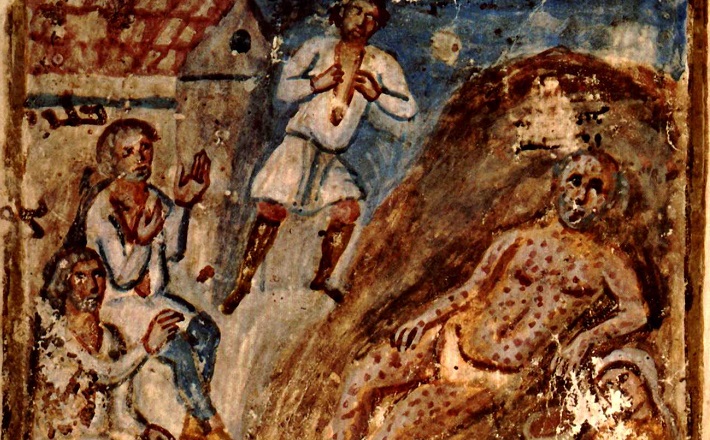Commentary on Job 1:1; 2:1-10
The Book of Job tells a very un-American story.
Our national myths favor rags-to-riches, underdog-to-victor, pull-yourself-up-by-your-bootstraps storylines. But Job does not fall into any of these categories. In fact, his is a billionaire-to- beggar, top dog-to-underdog kind of story. What happens to Job is our worst nightmare. He is a good person who does all the right things and ends up losing everything — his family, friends, home, possessions, and even his health. It takes just 35 verses to catapult Job from his perfect life to an ash heap, covered in oozing sores, and completely alone.
And all of this has been set in motion by God for no other reason than to enter into a wager with his employee, the Accuser (ha-Satan in Hebrew). During what seems to be an employee check-in at which Satan is present, God asks Satan what he’s been up to, where he’s been. Satan responds, “From going to and fro on the earth, and from walking up and down on it.” God then asks, “Have you considered my servant Job?” Maybe a clearer translation of this question would be, “Have you noticed or paid attention to my servant Job?” God is the one who mentions Job, who points him out to Satan, not the other way around. God wants to show the Accuser that God’s servant, Job, is righteous in every way and will put up with anything rather than sin or turn away from God.
God wins this bet — Job doesn’t turn away or curse God. But the story isn’t as straightforward as that. What follows are 39 chapters of poetry in which Job curses not God but the day he was born, attempts to put God on trial, and suffers through the speeches of his so-called friends who try to convince him that he’s done something wrong. Eventually God weighs in — but with questions — dozens of them — rather than answers. Finally, there is no happy ending, at least one that would appeal to most of us. In chapter 42 (which we’ll get to in a few weeks) the original story concludes with Job still in dust in ashes but with a new understanding of God. (To be perfectly fair, this ending bothered the ancients as well — so much so that later interpreters created a more palatable ending in which Job is restored to his former status and position, with even more wealth, and a brand new family.)
An American version would require some “action” on Job’s part. He wouldn’t just sit on the ash heap complaining, cursing the day he was born, and demanding a reason from God for what has happened. No, Job might start out in protest, but, being such a remarkable person he would “get over it” and “move on.” He might get a good lawyer to help him recoup some of his losses but he would focus on reinventing himself. He would get into a new line of work — one with more potential than land and cattle. He would find a new wife — someone more supportive and who understands him better and perhaps a therapist to help him deal with grief. He would get better friends since the old ones were of no help at all. He would work day and night. He would keep at it until he was on top again; in fact, he would emerge in a situation even better than before. His experience would have had a purpose — it would have taught him something. It would have been worth it in the end.
But that’s not the story we find in the Hebrew Bible. What ARE we supposed to do with this story of loss and divine abandonment? Where is good news or at least inspiration in our text? What do we make of a God behaving badly, a Satan-figure who’s not all bad, and a wife who tells her husband to curse God and die? It’s convenient to let God off the hook, to blame Satan or Job’s wife (or both), or to question — like his friends — whether he was really so good after all. Throughout history, biblical interpreters have resorted to these solutions as a way to avoid some of the very difficult questions that the text asks. Questions that make us uncomfortable but that we all wonder about, especially when things are difficult.
Perhaps the biggest question for people of faith is this: How can a God whom we believe to be good and just allow or even instigate what we see and experience as evil? Harold Kushner aptly described the dilemma in the title of his book, When Bad Things Happen to Good People, which he wrote after the death of his young son. In it he works with the story of Job as he attempts to reconcile this tragic loss with his understanding of and faith in God.
This is a dilemma that, if we are honest, we know something about. We’ve seen it. We have lived it. This is the kind of thing that keeps us awake at night, that causes us to really wonder whether or not there is a God or whether God cares about us. It is also a dilemma that can push us away from God. The biblical writers were certainly aware of the danger in the story they were relating. It was dangerous then just as it’s dangerous now. Anytime when we ask hard questions, when we press for truth, when we don’t accept easy answers, there is the risk of danger. Maybe that’s why this story was included in the canon, though. The Book of Job invites hard questions, looks reality in the eye, and provides a model for getting at some kind of truth. And the good news might be that God can handle all of it — questions, reality, and difficult truths.


October 4, 2015